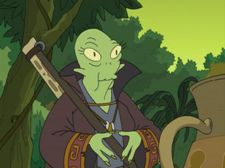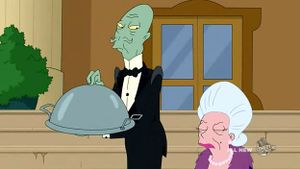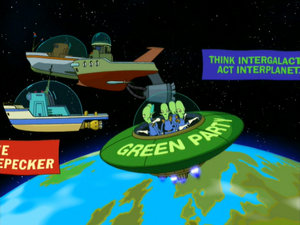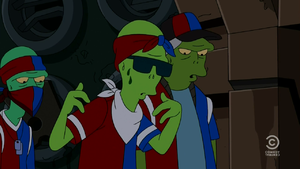Amphibiosans
| Amphibiosans | |
|---|---|
| Homeworld | Amphibios 9 |
| First appearance | "Love's Labours Lost in Space" (1ACV04) |
The Amphibiosans are humanoid creatures that are smaller and lankier than the average human. They resemble amphibians on Earth, with whom they share some basic traits, but they are more closely related to the sea cucumbers. They have no hair (except Kif had stubble) and possess only three fingers on each hand and two toes on each foot. Their skin color is a light green, and their slanted eyes are greenish-yellow with slit-like pupils. The Amphibiosans have no noses to speak of, but possess two nostrils, and the ears are set quite low on the head and stick out a bit. Their mouths are like lipless beaks. Their blood is green, and they have no bones and are instead supported by a system of liquid-filled bladders. The only known difference between males and females is that the females have eyelashes and the males don't. Both genders are capable of giving birth. Their social structure is clan-based, and their homeworld is an important member of the Democratic Order of Planets.
Life cycle
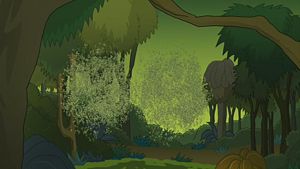
Amphibiosans have three distinctive phases in their life cycle that they go through, the tadpole, the "bulboid" and the swarm of hookworms. Amphibiosans bear their young inside their bellies like mammals until they are ready for birth. The post-birth life of an Amphibiosan begins in the swamp of their clan's birthing grounds. (In a deleted scene of "Kif Gets Knocked Up a Notch", we learn that Earth's salmon stole the practice of returning to a particular birthing ground from Amphibiosans). The parent gives birth on the shore to several dozen or hundreds of tadpole-like offspring which make their way towards the water, a dangerous phase in which their lives are threatened by predators. The role of the smizmar in this part of the process is to protect them on their short journey. The next twenty years are spent in the water, until they mature into children, sprout legs and crawl ashore. According to the Grand Midwife, this phase is called a "bulboid". From there, the life cycle seems to be similar to that of humans until it nears its end; at old age, Amphibiosans morph into a swarm of flying hookworms, though they appear to retain a single conscious mind. When an Amphibiosan dies, it continues to feel pain for up to 6 hours after death, as according to the Old Farmer's Wikipedia.
Reproduction
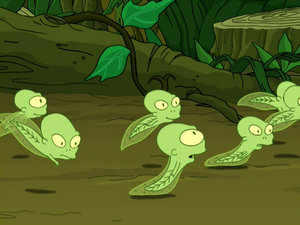
Amphibiosan reproduction differs from that of Humans in a number of respects. Most notably is the fundamentally different reproductive strategy. Where humans, like all mammals, employ a K-selection strategy, having a small number of offspring they care for and protect closely, Amphibiosans employ R-selection, having a huge number of offspring which are left to fend for themselves, like the Omicronians, Decapodians or terrestrial amphibians. In addition, while Amphibiosans reproduce sexually, combining the genes of two parents to produce offspring, this process is considerably more flexible than in humans. An Amphibiosan needs only come into contact with genetic material from an individual to become impregnated, and this individual does not even have to be a member of the same species. Reproduction also requires a smizmar, who may or may not be the biological parent of the children, but is regardless viewed as the true second parent by Amphibiosan custom.
Much is still unknown about Amphibiosan reproduction; for example, it is known that males can become impregnated, but given that they do not require sexual intercourse or even genetic compatibility to reproduce, the purpose of the male/female dichotomy is unclear. It is possible they are an evolutionary throwback to an earlier stage of their development, before they evolved their modern system of reproduction; if so, the difference may be superficial. It is even conceivable that they do not have true genders at all, but that each Amphibiosan chooses a gender that suits their personality in order to assimilate with other species like Humans more easily. However, it has been implied in the episode "That Darn Katz!" that Amphibiosans are also able to reproduce like humans when Kif and Amy have intercourse after getting really drunk. When Amy awakes the next morning, she sees a green puddle on the floor. She asks Kif if he has "yacked" on the floor, and the puddle(which turns out to be Kif) answers in the affirmative.
Racial abilities
Amphibiosan's bodies can be stretched very far, and they can bloat parts of themselves by pumping air inside them. They have no bones and are supported by a system of fluid-filled bladders, which is probably responsible for their stretching ability. They possess a camouflage reflex that may be triggered involuntarily by shock or surprise, blending the Amphibiosan into the background - they become seemingly transparent, except for their eyes. They can also bloat their heads to scare away predators. Amphibiosan are also capable of attaching themselves to walls and ceilings with their hands and feet, like a gecko. If necessary, they are able to shed their skins, although for some unknown reason they seem to wear underwear under their skin...
Hybrids
Besides the previously mentioned offspring of Kif, it is suspected that other Amphibiosan hybrids may exist. While his species shares some common traits with them, Hobsy, butler of socialite Mrs. Astor (6ACV12), has rounder eyes and pupils, more defined ears, a moustache like structure, and, most notably, a nose, never seen on Amphibiosans.
Characters
Additional Info
Trivia
- The term "Amphibiosan" is derived from the name of the planet and, while an accurate description of the planet's life forms, may not be the species' correct name. "Moistoid" has recently been used by Comedy Central, but it is unclear if this is canon.
- The term, in use since 2007, first appears in "The Board Game Games" (2013). While the comics are not typically considered canon, this issue was written by episode writer Eric Rogers.
- Amphibiosans are considered married when the female stops sleeping with the male's superior officer.
- They walk on walls, change colors and inflate their heads to scare predators.
- Amphibiosans share many traits with the Decapodians:
- They are both amphibious
- Neither have bones
- They both have massive amounts of young that are left to fend for themselves
- They both go through different physical stages in their life-cycle.
